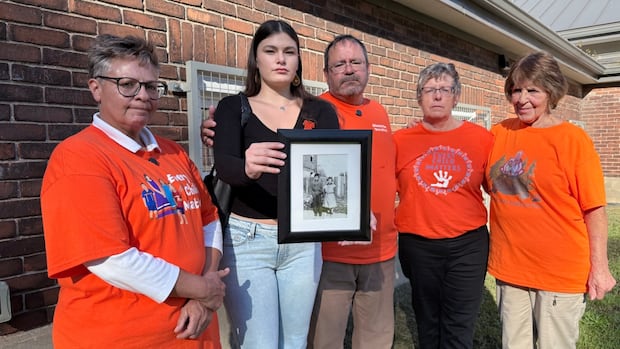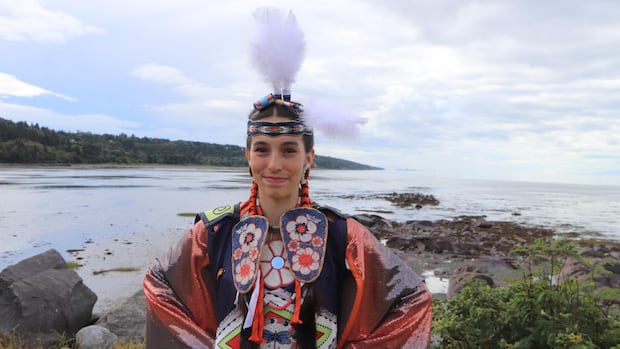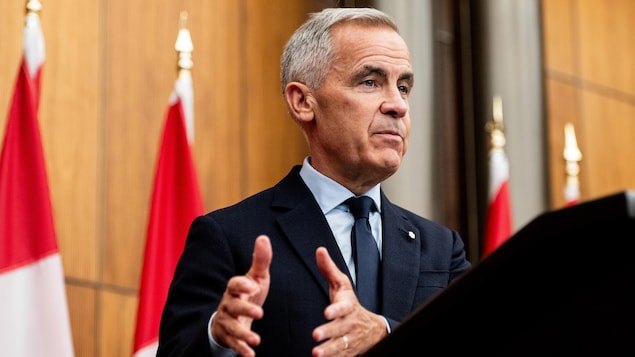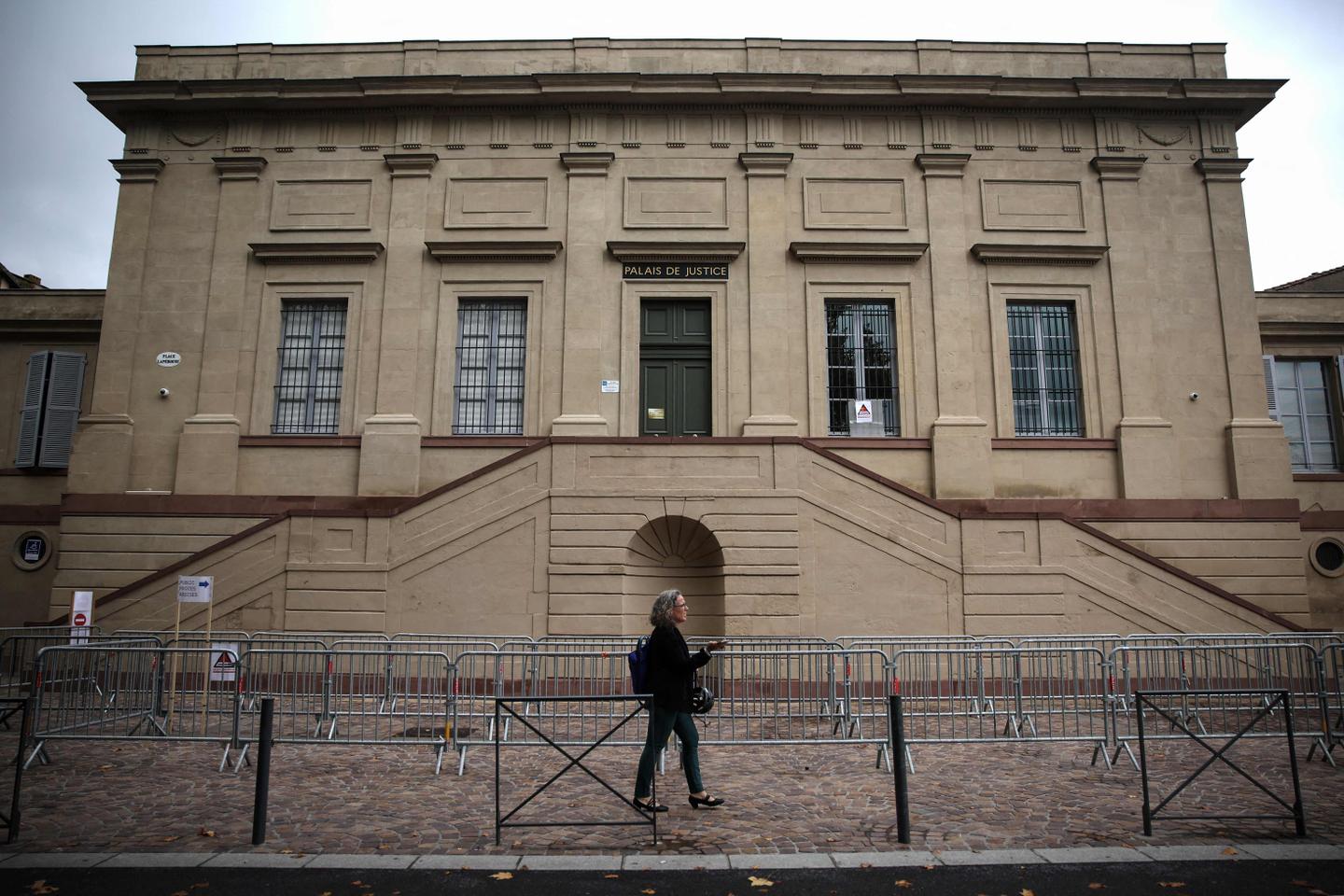The former Mohawk Institute — the longest-running residential school in Canada and now named the Woodland Cultural Centre — has opened to the public for the first time as a museum on National Day for Truth and Reconciliation. Around 15,000 children from 60 communities across Canada attended the residential school run by the Anglican Church and federal government from 1828 until 1970.
The Woodland Cultural Centre, a new museum that was once Canada's longest-running residential school in Brantford, Ont., held its grand opening on the National Day for Truth and Reconciliation, drawing hundreds to the renovated building that highlights Indigenous language, culture, and art and history.
On Tuesday, some of those who came out told CBC News they wanted to learn about the history of the former Mohawk Institute, while others wanted to honour parents or grandparents who were forced to go there as children. Some 15,000 children from 60 communities were sent to the residential school, which was run by the Anglican Church and federal government from 1828 until 1970.
Around this time — this is the fifth year that Truth and Reconciliation Day has been marked as a federal holiday — Indigenous people are often asked what reconciliation means to them, said John Moses, who was at the museum opening with his cousins, Lesley and Patty Davis, who said they're of mixed Mohawk and Mohican Delaware heritage.
"Reconciliation resides with non-Indigenous Canadians to reconcile themselves to what the true history of the country really is. And families like ours provide the truth telling."
Standing where their relatives stood
While at the museum, Moses and his cousins stood with a framed photograph of Moses's father, Russ, and Lesley and Patty's mother, Thelma, in the same place where the photo was taken in October 1943 when the young siblings attended the institute.
The image, Moses said, shows the pair during a once-monthly 15-minute visit that the school allowed them.
Hundreds visited the Woodland Cultural Centre in Brantford, Ont., on the National Day for Truth and Reconciliation on Tuesday for the grand opening of the museum that emerged from the former Mohawk Institute, once Canada's longest-running residential school. (Aastha Shetty/CBC)
Moses said his father wrote a memoir about his experience at the school in 1965. The cousins said their parents refused to be defined by their harsh experiences at the school.
Russ went on to serve in the navy and play a leadership role in developing an Indigenous pavilion at Expo '67 in Montreal. Thelma was a leader who advocated for an apology from the Anglican Church for its part in residential schools, the cousins said.
Those schools had "a severe impact on the [First] Nations," Lesley told CBC News. "That has to be acknowledged, reconciled … and never to be brought back here again."
WATCH | Woodland Cultural Centre museum emerges from longest-running residential school: Canada’s longest-running residential school reopens as a museum Duration 2:02 Canada's longest running residential school, known as the Mohawk Institute, has reopened as a museum at Ontario’s Woodland Cultural Centre with the goal of preserving the stories of the hundreds of children who were forced to attend and the legacy of abuse that often happened inside.
At least 105 died while enrolled at the Mohawk Institute, according to the Survivors' Secretariat, a survivors-led group from the institute that aims to support investigations into missing children at the site. Students died of illness or injury, or ran away and died elsewhere.
Descendants of Russ and Thelma Moses, pictured in the photo frame, stand in the spot where the siblings were photographed while being forced to go to the Mohawk Institute in 1943. ( Aastha Shetty/CBC)
The Woodland Cultural Centre was established two years after the residential school closed to focus on gathering research and artifacts. Until now, it had been shut to the public since 2019 for renovations.
"I think this building holds that really tangible evidence of what occurred at residential schools and what our families experienced," Heather George, the centre's executive director and chief curator, told CBC News. "When you're in the space itself, it actually impacts you differently and I think it really sticks with you.
"I hope this becomes a catalyst for people who come, that they want to learn more."
George added she hopes visitors also look to the present and how a legacy of discrimination affects Indigenous communities today.
A replica classroom within the Woodland Cultural Centre shows what part of the Mohawk Institute residential school looked like. (Aastha Shetty/CBC)
Carol McDonald, Brian Burleigh and Cathy Mountenay, who are cousins from Mohawks of the Bay of Quinte, said their grandmother was forced to go to the Mohawk Institute, but they don't know for how long because she would never speak of it.
"We're here to honour all the people who had to endure what they had to endure here," Burleigh said, noting he grew up not knowing about residential schools, even though he was an adult before the institution ended.
He said he feels this is a time where it's OK "to be open and be Native," unlike when he grew up in Toronto and "it was not considered a good thing."
Burleigh said his grandmother told his father to tell people he was Scottish, not Indigenous, for fear he would have to endure what she did.
McDonald said she expected an emotional day for the museum grand opening, but that she and her family would "stand and cry" together.
"We need each other."
Carol McDonald (second from left), Brian Burleigh (second from right) and Cathy Moutenay (third from right) are cousins and went to the Woodland Cultural Centre opening to see where their grandmother was forced to go to residential school when she was a child. (Aastha Shetty/CBC)
Jessica and Kyle Nguyen are siblings who went to museum on Monday.
Kyle said the two had recently taken a course about the history of workers who are Black, Indigenous and "people of colour" through their union, and they wanted to learn more about local Indigenous history.
"We're visible minorities, so in order to help each other out, we have to be strong allies for each other," he said, and that involves understanding one another's pasts.
Before George, Janis Kahentóktha Bomberry was the Woodland Cultural Centre's director for 20 years.
Bomberry told CBC Radio's Fresh Air about starting the campaign to restore the institute. At the time, she said, most community members her team consulted were in favour of keeping it open so that people remember what happened there.
Part of the institute's restoration is a language centre, which Bomberry said she fought hard to preserve. Many children who went to the centre were punished for speaking their own language and forced to speak English.
For Bomberry, the preservation is a "middle finger" to a system that tried to wipe Indigenous languages out.
"You tried and you failed because we still have our language," she said. "You failed and we're still here."
A national Indian Residential School Crisis Line has been set up to provide support for former students and those affected. People can access emotional and crisis referral services by calling the 24-hour national crisis line: 1-866-925-4419.
Mental health counselling and crisis support is also available 24 hours a day, seven days a week through the Hope for Wellness hotline at 1-855-242-3310 or by online chat at www.hopeforwellness.ca.
[SRC] https://www.cbc.ca/news/canada/hamilton/national-day-for-truth-and-reconciliation-2025-woodland-cultural-centre-1.7647398
 Visit the website
Visit the website





